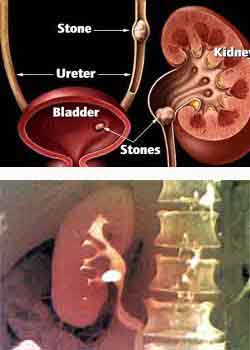Call Us: +91- 88-00-18-19-20
akg.urogyn@gmail.com
Call Us: +91- 88-00-18-19-20
akg.urogyn@gmail.com

Stone
 Human body gets rid of a lot of waste material through the urinary system. A number of substances are normally excreted in urine.
Some of these salts, if excreted in excess amount, get precipitated in urine forming urinary stone.
Human body gets rid of a lot of waste material through the urinary system. A number of substances are normally excreted in urine.
Some of these salts, if excreted in excess amount, get precipitated in urine forming urinary stone.
Stone in the urinary system can be present in either of the two Kidneys, their draining pipes, the Ureters, Urinary Bladder or
final urinary passage, the Urethra. .
Treatment of Urinary Stones:-
A. Medicinal treatment
Medicines are given to the patient of stone disease to control pain and infection.
There is hardly any medicine in the world which can bring the stone out. Except for uric acid stones, there is no medicine which can dissolve the stone.
Stone once formed inside the body, either passes out spontaneously or it needs to be removed by urologist.
B. Surgical Treatment
There are various surgical options available for treatment of urinary stones.
Surgical Procedures used for treatment of Urinary Stones:-
Open Surgery:- Various open surgical operations have been in use for centuries for
removal of urinary stones. These are used less often now-a-days because of availability of better options in the form of endoscopic procedures.
ESWL
Extra-corporeal Shock Wave Lithotripsy was extremely popular in 1990s as
it was touted to be painless, non-invasive and OPD procedure, but, it could not stand the test of time. Now,
it is used less often and that too for selected cases. As a matter of fact, it is neither painless, nor non-invasive and it has an unacceptably
high failure rate. I have world's best machine i.e. Dornier,
installed at Maharaja Agarsen Hospital for treatment of urinary stone patients.
PCNL
Single key-hole procedure which has gained extreme popularity over last two decades due to excellent results and
cost-effectiveness. It requires a trained urologist to do it. It has proved to be most suitable for Indian stones as these are
voluminous and hard due to presence of oxalate monohydrate. Various Urological Associations world over recommend
PCNL as the modality of first choice applicable to majority of kidney stones.
RIRS
Retrograde Intra Renal Surgery is a technique under evolution and used less often because it is not value for money. Presently,
is recommended as a secondary procedure for small residual calculi in the kidney. Failure rate is high and larger stones cannot be removed.
URS
Uretero-renoscopy is a very popular operation used for transurethral retrieval of ureteric calculi. It is a very gratifying procedure and has stood the test of time.;
hence, practised by urologists all over the globe.
Cystolithotripsy: It is the procedure for removal of stone from the urinary bladder.Big sized stones are reduced to smaller pieces before retrieval through the small hole. Various energy sources are used to break the stone in the system. These are Pneumatic Lithotripsy, Laser Lithotripsy, Ultrasonic Lithotripsy and alikes.
 Prevention of Urinary Stone Formation
Prevention of Urinary Stone Formation
We can do very little to prevent stones in the urinary system. Still, followings are useful:-
Adequate water:- As we know that the stones form in urine by precipitation of salts,
adequate water intake definitely helps in prevention of stone formation irrespective of type of stone.
Water intake should be sufficient to produce 2 litres of urine in 24 hrs. In India, one should be extra careful
in not restricting water intake during the months of April to September
 Medicines:-Regular intake of medication for prevention of urinary stone is effective and recommended only for uric acid stone disease.
Medicines:-Regular intake of medication for prevention of urinary stone is effective and recommended only for uric acid stone disease.
Infection:- All attempts should be made to maintain urine free of infection. Long-standing infection in
urine is bound to invite stone formation and this is the commonest cause of repeated stone formation in our country.
Can you know the composition of your stone
Yes. Stone passed out spontaneously or removed surgically can be subjected to analysis to find out the
composition of stone. Only quantitative analysis is useful and qualitative analysis carries no meaning.